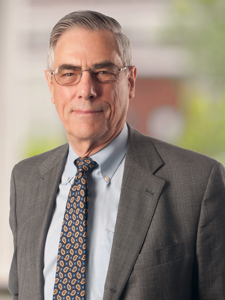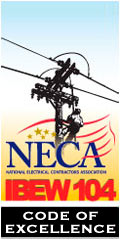
| Past Issues/Subscribe | Employment | neppa.org | Legislative Update | Advertise | April 2015 |

Historic Interview: Bob McDiarmid
In honor of our 50th Anniversary, we continue to feature significant figures from our past. This month we spent time with Bob McDiarmid. He is a recognized leader and authority on federal energy regulation, specializing in matters of interest to municipally- and cooperatively-owned utilities. In the course of briefing and arguing dozens of cases in the courts of appeals and the U.S. Supreme Court, Bob has helped those courts reach resolutions which have significantly changed the pre-existing perception of many participants in the industries involved. These include three seminal cases in the U.S. Supreme Court, which dealt with the interrelation of the regulatory schemes chosen by Congress and the principles of the antitrust laws. A frequent speaker at industry, economic and legal meetings and author of numerous important articles on power issues, Bob helped to found the firm in 1970 after serving as Assistant to the General Counsel of the Federal Power Commission (FPC), FERC’s precursor.
Bob’s approach to client issues is informed by his undergraduate and graduate education in engineering and engineering physics, as well as by his knowledge gained through his early appellate work for the Department of Justice and the FPC. He has been recognized as a 2014 AV Preeminent-Top Rated Lawyer® for Energy, Environmental and Natural Resources by ALM Media.
To see a more detailed biography of Bob, please visit here: http://www.neppa.org/images/pdfs/Robert_McDiarmid.pdf
Here are a few excerpts from the conversation:
What was NEPPA’s greatest accomplishment in 50 years?
That itself requires some background, I think. When NEPPA was formed you had several things going on, you had the proposition that nuclear power, which is not going to be available to anyone other than the members of the "big 11 power loop", nor the IOU’s at the time. It would be too cheap to be here. You had the idea that there would be transmission being built that didn’t then exist in order to handle these proposed nuclear plants which would tie the region together. You had a history of not much cooperation going on among the municipals and the co-ops. NEPO was being proposed , we weren’t going to be allowed into that of course, and so there was a for access that was going on, which required cooperation by the various cities and co-ops and fire districts and what have you in New England. The fact that it’s managed to hold together and survive with a whole lot of improvements is a tremendous historic event I think. What was NEPPA’s most valuable program?
Actually, I think the most valuable program was a program it didn’t formerly have. The programs it formerly had were those everybody could agree too. Those were training, your lineman training, board member training, and those kinds of things. But that wasn’t the primary thing I think that came out of this. You could easily mention power supply and power supply was at least, as I remember it, not really one of the things that NEPPA itself did but one of the things that came about because of NEPPA. Things like the access to NEPOOL, access to transmission, a lot of things that NEPPA facilitated but didn’t formerly do. So I think NEPPA’s facilitating of a lot of things was the most important things it did. What did you see as NEPPA'S primary role?
Historically, and I’ve got to qualify this by saying, I have been pretty much retired for the last 7 years so I don’t know for sure exactly where things are right now but historically I think it’s most important role has been providing access and providing a central point for what can be called advocacy in Washington. That’s been a thing we were historically lacking until NEPPA picked up that role trying to sort of coordinate the mission between the muni’s and co-ops in New England and Washington and that’s been a pretty important factor and will be one in the future. What do you see as NEPPA’s primary role in the future?
Given the fact that I think there is a lot of resistance, there has been historically a lot of resistance at least, to attempting to coordinate among members across state lines, I think is probably going to be doing the same thing it’s been doing in the past, which would be a facilitation role. You will continue to do the formal training kind of things that you do and do very well, but I think the important thing is if we can get participation on other things. How did NEPPA help you personally?
I’m not sure that I’m the right person to ask that. I worked with a number of NEPPA heads over the years, Chip Stockford, Andrew Natsios and Pat Hyland. I never really worked very much with Larry at all. I’ve enjoyed working with them all; I don’t know that NEPPA has helped me directly. If I used the word "visionary," what NEPPA employee or member comes to mind?
You know there are an awful lot of people who were visionary over the course of nearly 50 years of dealing with NEPPA. There are a lot of members and I really don’t want to omit any but the ones that come to mind are people like Frank James of Holyoke, Johnny Corkis of Chicopee, Mike Collins of Wakefield, Jim Baker of Shrewsbury, Horst Huehmer of Hudson, Curt Lanciani of course, Pierre Hereaux of Littleton, John Pillsbury with NHEC, Walter Cook, Bill Gallagher, oh I’m sure I’m overlooking some, but there are a batch of people who had a vision and who managed to make a lot of it come true and worked very hard to do so. Do you feel NEPPA should play a major or minor role in Washington?
For its members? Members are a lot stronger if they can play a united role; any role almost has to be played with NEPPA as a part of it. How do you think the challenges today compare to the challenges that your generation faced? Specifically, how the two periods of business model changes compare.
The whole history has changed of course, in fairly major ways, and in the process of that NEPPA members have gained quite a lot of information and access in power, comparatively. So to the extent they can pull together as opposed to pulling in different directions, it’s a lot better. At the time I got involved, NEPPA members really had no power or very little in almost any way, to the extent that they owned any kind of generation; it was small and efficient and costly. There were NEPPA members who stayed up and running in the 1965 blackout simply because they were not interconnected. And they were used to start the rest of the system but they shouldn’t have been in that position to begin with and that cost them a lot of money and it cost their citizens an awful lot of efficiency. That’s no longer a serious issue; now we’re getting down to the point where I think the next phase is going to be revision of reliable wire service and that’s something for which NEPPA members are very well suited and very well situated because they either have people on site whereas some of the IOU’s have to come 100 miles. What has been the biggest change in the industry over the past 50 years?
The biggest thing has been the consolidation of the industry and the additional access that is afforded to smaller entities such as those at NEPPA. What about the biggest event?
Separation of generation and transmission. What do you think is the biggest influence of the future in the industry right now?
I’m looking for a way to answer that coherently. That is a fairly difficult question. I think the best answer to that is whenever we thought there was a biggest influence for the future, it turned out to be wrong. It’s probably wrong to try to predict that; we all thought nuclear energy too cheap to meter and now as someone has pointed out it’s too expensive to matter. Now it’s again more likely to be appropriate and if we are having to deal with global warming issues, will there be a tax on carbon emissions or equivalent, if there is, that will be very important but we don’t know if that’s going to happen. And if there is one how will it be done. I think all that one can say is just keep watching to make sure we get on top of what’s happening (laughing).  |






